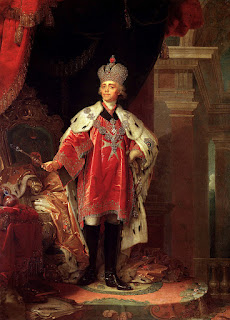By Batya Shevach
Rabbi Shneur Zalman (Wikimedia Commons)
“Our sages teach us that ‘sovereignty on earth, is similar to the sovereignty of the Heavens.’ As the fear before God is great, so too did I feel an unusual awe when you entered. Such a feeling I never experienced with any of the officials that have come here. Therefore I conclude that you must be the Czar.”
“He loveth righteousness and justice; the earth is full of the lovingkindness of Hashem.”
Psalms 33:5 (The Israel Bible™)
Illustrative (Photo: Shutterstock)
Two-hundred and nineteen years ago, the first rebbe – founder and leader – of the Chabad Hassidic movement in Russia was miraculously released from jail. He credited his liberation to the heavenly merit he earned through collecting charity to support the poor, widows and orphans living in the Holy Land at that time through his organization Colel Chabad. The repercussions of Rebbe’s imprisonment and release continue to affect the world, and the wellbeing of Jews in Israel even today.
On May 8, 1798, a fabricated complaint against Rabbi Shneur Zalman of Liadi, known as the Alter Rebbe, claimed that the illustrious Torah scholar was in fact an anti-Russian revolutionary. He was accused of sending money to Turkish-controlled Palestine and engaging in subversive activities against the Russian government.
Rabbi Shneur Zalman (Wikimedia Commons)
An investigation of the Rebbe began in August 1798, and the Czar himself took a personal interest in the case. He knew that the Rebbe had over 100,000 followers, with many living in recently occupied Polish territory. If the Alter Rebbe was a true insurgent, he might lead a full blown revolt against the Russian regime.
During the week-long Sukkot holiday (Feast of Tabernacles) of 1798, an armed officer was sent to Liozna to arrest Rabbi Shneur Zalman. The Rebbe heard about the officer, and decided to follow Biblical advice, “Hide yourself for a brief moment.” (Isaiah 26:20). The officer returned to his commanders empty-handed. After contemplating his fate for several hours, the Rebbe decided that if the officer returned, he would surrender himself and leave peaceably.
The officer did come back in the evening of the last day of Sukkot, and the Rebbe was taken away in the “Black Mary” – a carriage reserved by the Czarist regime for transporting the worst criminals. The carriage had no windows and was covered with heavy, black metal panels. It instilled terror in anyone who saw it.
Rabbi Shneur Zalman was held in the fortress of Petropavlovsk, a well-guarded political prison. During the intensive investigation numerous documents were sent back and forth between high ranking government officials. The Rebbe testified orally and in writing about his personal activities and his Biblical teachings. His handwritten testimonies were translated from Hebrew to French, and then into Russian.
The investigators found no incriminating evidence. Disguised as a simple clerk, the Czar visited the Rebbe in prison to see the infamous Jewish leader for himself. The Rebbe immediately stood up in a show of respect. The Czar asked the Rebbe why he stood. “For truly you must be the Czar!” answered the prisoner.
Paul 1 was Czar of Russia in 1798. He was the son of Catherine the Great and possibly her lover.
The Czar saw through the lies spread about the Rebbe and decreed that he was certainly no traitor. On Tuesday, the 19th day of the Hebrew month of Kislev (November 16, 1798), 53 days after his arrest, Rabbi Shneur Zalman was cleared of all charges and set free. Furthermore, the Czar ordered the Governor of Lithuania to release the Rebbe’s followers, arrested at the same time.
In the Alter Rebbe’s first letter after his liberation, he attributed his freedom to his acts of sending charity to the poor in the Land of Israel. He wrote to Rabbi Levi Yitzchak of Berditchev: “Who am I, a lowly person as I am, that God has brought me this far and Heaven’s Name was sanctified through me…. But it was God who gave us this privilege by virtue of the Holy Land and its residents, and may He help us at all times to broaden our borders, and extricate us from dire straits.”
“For the poor shall never cease out of the land; therefore I command thee, saying:
‘Thou shalt surely open thy hand unto thy poor and needy brother, in thy land.”
Deuteronomy 15:11 (The Israel Bible™)
Just as the Alter Rebbe did over 200 years ago, Colel Chabad continues its mission to help the Holy Land’s poor and provide assistance to needy residents until today. Ongoing immigration, difficulty earning a living, and the constant threats of war and terror still cause many in Israel to question where their next meal is coming from.
Rabbi Lipsker, administrator of Colel Chabad, commented, “After the Alter Rebbe’s demise in 1813, each subsequent Rebbe in the chain of the Chabad movement’s leaders diligently oversaw the Colel Chabad activities in Israel. The Alter Rebbe’s initiative ensured the survival of the Holy Land Jews before any other formal organizations cared for them.”
Colel Chabad is the oldest charity organization in Israel, with 24 soup kitchens around the country, holiday food packages for poor families and senior citizens, summer camps and afterschool programs for underprivileged children, wedding and bar mitzvah celebrations arranged for orphans, and special programs for hospitalized children. It’s work continues to be crucial even today.
To donate to Colel Chabad, please visit here.
Pure and undefiled religion in the sight of our God and Father is this: to visit orphans and widows in their distress, and to keep oneself unstained by the world. James 1:27



No comments:
Post a Comment